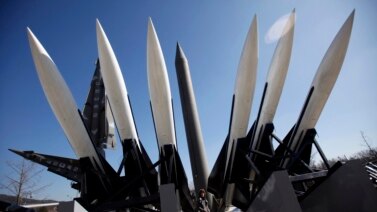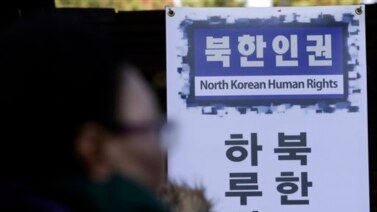Business leaders in South Korea are urging President Park Geun-hye to ease trade restrictions with North Korea. South Korea put the restrictions in place in 2010 after the sinking of a South Korean warship.
Pro-business groups believe that expanding trade and investment will help their businesses and contribute to long-term peace and security on the Korean peninsula.
A group called “The Emergency Response Committee of Inter-Korean Economic Cooperation” says it represents more than 140 South Korean companies. All of these businesses formerly traded with or operated in North Korea. Members of the group now hold weekly demonstrations in Seoul.
The South Korean government cut many economic ties with North Korea in 2010. It acted after a North Korean submarine reportedly sank a South Korean navy ship, killing 46 sailors.
Yoo Dong-ho is the president of the Emergency Response Committee. He says the nearly five-year-old trade restrictions have failed to hurt North Korea but have punished South Korean companies.
He says, “In North Korea, management rights and control of the businesses that South Koreans have invested in were given to China, Russia and Europe. Only South Korean businesses have been destroyed.”
South Korea still lets businesses operate in North Korea’s Kaesong industrial zone. The 55,000 North Koreans working in the zone earn between $70 and $100 a month. That is much less than the lowest legal wage in the South. The wages are not given directly to the workers, however. They are paid to the North Korean government.
President Park and her allies say North Korea must make amends for past aggression and for violating nuclear agreements before South Korea will agree to lift the trade ban. But she says it is time for the two sides to start talking again about peaceful reunification.
She says, “My position is that to ease the pain of division and to accomplish peaceful unification, I am willing to meet with anyone.”
South Korea National Assembly Representative Hong Ik-pyo is with the opposition New Politics Alliance for Democracy. He says expanding trade and business ties are important parts of a successful unification process.
He says, “For countries under conflict such as China and Taiwan, the most important things are the processes of peace, exchange and cooperation. I think it is not appropriate to move towards reunification without those things.”
In South Korea, many people question whether re-establishing trade ties with North Korea would bring peace to the Korean peninsula. They remember that North Korea promised to end its nuclear program in exchange for aid, but failed to honor that promise.
I’m Christopher Cruise.
VOA Korea Correspondent Brian Padden reported this story from Seoul. VOA News Producer Youmi Kim in Seoul contributed to the report. George Grow wrote it for VOA Learning English. Christopher Cruise edited the story.
Words in This Story
trade – n. the activity of buying, selling or exchanging products or services
business – n. one’s work; buying and selling to earn money; trade
submarine – n. an underwater ship
Do you believe trade restrictions between North and South Korea should be eased? Do you believe trade can bring peace to the Korean peninsula? We want to hear from you. Write to us in the comments section.

